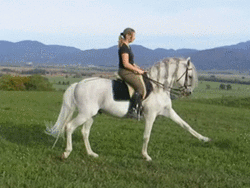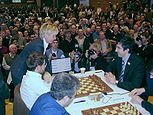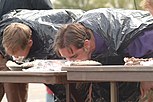Competition: Difference between revisions
(add info) |
(add info) |
||
| Line 23: | Line 23: | ||
A trade promotion lottery or competition is a free entry lottery run to promote goods or services supplied by a business. An example is where you purchase goods or services and then given the chance to enter into the lottery and possibly win a prize. A trade promotion lottery can be called a lotto, competition, contest, sweepstake, or giveaway. | A trade promotion lottery or competition is a free entry lottery run to promote goods or services supplied by a business. An example is where you purchase goods or services and then given the chance to enter into the lottery and possibly win a prize. A trade promotion lottery can be called a lotto, competition, contest, sweepstake, or giveaway. | ||
Such competitions can be games of luck (randomly drawn) or skill (judged on an entry question or submission), or possibly a combination of both. | |||
Revision as of 20:25, 21 April 2021
A competition or contest is an event where people get together to see who is the best at something. Someone who takes part in a competition ("enters for a competition") is called a competitor. The competitors compete against one another. The person who wins may get a prize. The prize might be a trophy or money.
Competitions can be for lots of different things, for example, sport, writing, music, dancing, science, or chess.
Some competitions need a referee. The referee will make sure that the game is played fairly and that the competitors obey the rules. In events like music competitions there will often be an adjudicator who will decide which person they think is the best.

Biology and ecology
Competition within, between, and among species is one of the most important forces in biology, especially in the field of ecology.[1]
Competition between members of a species ("intraspecific") for resources such as food, water, territory, and sunlight may result in an increase in the frequency of a variant of the species best suited for survival and reproduction until its fixation within a population. However, competition among resources also has a strong tendency for diversification between members of the same species, resulting in coexistence of competitive and non-competitive strategies or cycles between low and high competitiveness. Third parties within a species often favour highly competitive strategies leading to species extinction when environmental conditions are harsh (evolutionary suicide).[2]
Competition is also present between species ("interspecific"). When resources are limited, several species may depend on these resources. Thus, each of the species competes with the others to gain access to the resources. As a result, species less suited to compete for the resources may die out unless they adapt by character dislocation, for instance. According to evolutionary theory, this competition within and between species for resources plays a significant role in natural selection. At shorter time scales, competition is also one of the most important factors controlling diversity in ecological communities, but at larger scales expansion and contraction of ecological space is a much more larger factor than competition.[3] This is illustrated by living plant communities where asymmetric competition and competitive dominance frequently occur.[1] Multiple examples of symmetric and asymmetric competition also exist for animals.[4]
Consumer competitions - games of luck or skill
In Australia, New Zealand and the United Kingdom, competitions or lotto are the equivalent of what are commonly known as sweepstakes in the United States. The correct technical name for Australian consumer competitions is a trade promotion lottery or lotto.[5]
Competition or trade promotion lottery entrants enter to win a prize or prizes, hence many entrants are all in competition, or competing for a limited number of prizes.
A trade promotion lottery or competition is a free entry lottery run to promote goods or services supplied by a business. An example is where you purchase goods or services and then given the chance to enter into the lottery and possibly win a prize. A trade promotion lottery can be called a lotto, competition, contest, sweepstake, or giveaway.
Such competitions can be games of luck (randomly drawn) or skill (judged on an entry question or submission), or possibly a combination of both.
Forms
- In nature, animals compete with one another for the best food, the best nesting places, etc. According to Charles Darwin, the competition in nature results in evolution.
- In business, firms that make the same things or offer the same services are in competition with one another (see market forms).
The adjective of 'competition' is competitive.
- If persons are "competitive" it means that they like trying to compete with other people.
- Businesses often say that they sell things at "competitive prices". This means that their prices are lower than those of other businesses which sell similar things.
Examples of competitions
There are a lot of different kinds of competitions, for example:
- Eating competitions, where people try to eat the most food
- Running competitions, where people see who is the first to run from one place to another
- Sport competitions, where sports teams try to beat each other to win a trophy
- Singing competitions, where someone decides which person sang the best
or see the gallery of images below:
Related pages
- ↑ 1.0 1.1 Keddy, P.A. 2001. Competition, 2nd ed., Kluwer, Dordrecht. 552 p.
- ↑ Baldauf, Sebastian A.; Engqvist, Leif; Weissing, Franz J. (29 October 2014). "Diversifying evolution of competitiveness" (PDF). Nature Communications. 5: 5233. Bibcode:2014NatCo...5.5233B. doi:10.1038/ncomms6233. PMID 25351604. Archived from the original (PDF) on 4 September 2019. Retrieved 4 September 2019.
- ↑ Sahney, S.; Benton, M.J.; Ferry, P.A. (2010). "Links between global taxonomic diversity, ecological diversity and the expansion of vertebrates on land". Biology Letters. 6 (4): 544–47. doi:10.1098/rsbl.2009.1024. PMC 2936204. PMID 20106856.
- ↑ Borzée, Amaël; Kim, Jun Young; Jang, Yikweon (7 Sep 2016). "Asymmetric competition over calling sites in two closely related treefrog species". Scientific Reports. 6: 32569. Bibcode:2016NatSR...632569B. doi:10.1038/srep32569. PMC 5013533. PMID 27599461.
- ↑ "OLGR > Promotions and competitions > Trade promotion lotteries". Olgr.nsw.gov.au. Archived from the original on 2013-07-29. Retrieved 2013-08-02.



